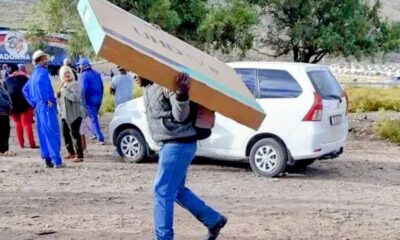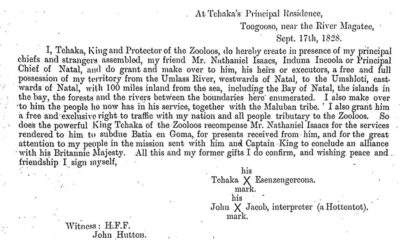
Featured Item

Terror takes a knock with arrests and FBI support
Published
3 years agoon
A number of men connected to previous local terror incidents were arrested in Durban last week in what could be a win for local and international law enforcement working to prevent terrorism.
A local expert speaking on condition of anonymity also confirmed that the American Federal Bureau of Investigation (FBI) is working closely with South African authorities to combat terrorism.
Jevon Greenblatt, the head of operations of the Community Security Organisation in Gauteng, says, “We understand that the authorities got a crime-related tip-off about a recent house robbery that had taken place. During this investigation and subsequent arrest, some of the suspects turned out to be the same people who had previously been arrested for terror-linked activities.
“Whether the authorities had prior inteligence on the suspects, or whether this was just a lucky break hasn’t been disclosed. We know that a number of individuals involved in terror-related cases that have taken place over the past few years are interconnected.
“Terrorism is a transnational issue that isn’t limited by borders,” Greenblatt says. “Terror networks operating in South Africa may also be operating elsewhere and vice versa. Many countries work together to share information and resources to deal with this borderless threat. The United States (US) has the resources and experience to help South Africa in this global war, and there’s no reason why our authorities wouldn’t capitalise on this to protect South African and US interests.
“It’s clear that this threat is being taken very seriously – and rightly so,” he says. “My concern is that some leaders don’t fully grasp the medium-to-long-term ramifications of radical ideologies gaining traction in our country. There is a narrative that attacks won’t happen here because South Africa is a ‘safe haven’ for terror recruitment and funding. Unfortunately, history has shown this approach to be flawed and short-sighted.”
He traces a web of terror connections in South Africa back to 2016, when the Thulsie Twins were arrested in the advanced stages of planning attacks against Jewish and other targets. “Along with the Thulsies, four others were arrested and subsequently released, including Renaldo Smith and Fatima Patel. Smith is rumoured to be fighting for ISIS [Islamic State]/Ansar al-Sunna in northern Mozambique together with other South Africans,” he says.
“Patel, together with her husband, Sayfydeen Aslam Del Vecchio, was arrested in 2018 for the murder of Rodney and Rachel Saunders in KwaZulu-Natal. Although the murder was ostensibly committed to steal money, those funds were ultimately moved to be used to fund ISIS recruitment and training. This demonstrates the worrying nexus between crime and terrorism,” Greenblatt says.
“In 2018, Farhad Hoomer, Ahmed Haffejee, and 16 others were arrested for an attack on the Verulam Mosque and the Durban incendiary bombing campaign. ISIS material was found during the arrest,” says Greenblatt. This case was later struck off the roll. “Since his release, Hoomer has visited and supported Patel and Del Vecchio in their court appearances, and is rumoured to be funding their defence.”
On New Year’s Eve 2020, shortly after midnight, a number of drive-by shootings took place at numerous locations across Johannesburg. “Although initially reported as crime or gang related, it later became clear that this was carried out by people associated with or supportive of ISIS,” Greenblatt says.
“Later in 2020, a kidnapped businessman was rescued from a farm in Kliprivier, and a number of perpetrators were arrested. During the raid on the farm, ISIS material, weapons, and vehicles were found. Some of the weapons and one of the vehicles matched those used in the New Year’s Eve shootings. At least one of the individuals arrested was also believed to have been involved in the Verulam Mosque attack and Durban bombing campaign.”
Greenblatt says that “all of this indicates an interconnected national network of ISIS-affiliated cells which are communicating, co-operating, and in some cases sharing resources to fund, establish, and expand the ISIS brand of radical Islam in South Africa. It’s not implausible that the latest Durban arrests were for criminal activities and that the money raised from these crimes was to be used for terrorism.”
Willem Els, senior training co-ordinator at the Institute for Security Studies (ISS), says “the FBI and New Scotland Yard have been assisting countries for many years. They have excellent expertise, especially in terror-related cases. In my experience, they play a support role and don’t impose.”
Els says that if those arrested are linked to other terror incidents in South Africa, “it will be the ideal opportunity for the police and prosecution authorities to win back the trust of the public with an effective investigation and prosecution after the so-called Hoomer case was struck off the court roll”.
“The dismissal of the Verulam case, in spite of overwhelming evidence against the suspects, is a major setback that will embolden those who seek to use terrorism and violence to harm us and our way of life,” said Greenblatt at the time.
Greenblatt says he doesn’t think this latest arrest will have a direct impact on the Thulsie trial, “but it does highlight the interconnectivity of the various groups or cells operating in our country and the reality that this problem may be bigger than many want to believe or admit”.
Asked if he thinks ISIS attacks in South Africa are imminent, Els says, “We have to be guided by similar events on the rest of the continent. ISIS’s threat of attacking targets within South Africa if the country became involved in Cabo Delgado was widely published. Similar threats were directed towards Cameroon not to get involved in the Boko Haram conflict. Cameroon became involved, resulting in some attacks on Cameroonian soil. Be that as it may, South Africa cannot afford to be held ransom by these threats. Should it become involved as part of SADC [the South African Development Community] in Mozambique, it opens itself to attack. South Africa needs to activate security contingency apparatus and plans as a precaution to counter these attacks. There is, however, no reason to panic.”
But Greenblatt says with these various factors at play, “I believe that an attack is a reasonable possibility. Whether it’s imminent or sometime in the future, I cannot say. The onus is on each of us to understand this reality, and to be proactive in better securing ourselves, our families, and our communities in order to be ready for such possibilities.”
Els says the ISS is on record that “South Africa created conditions conducive for these extremist groups to thrive and operate, especially generating and moving funds to these groups. The arrests of various individuals and groups that might be linked to ISIS in recent years indicates that these groups are active on the ground and serves as reason to worry. But we know that the government is working very hard to close the gaps caused by state capture and other poor governance decisions that weakened intelligence, investigating, and prosecuting capacity. As mentioned, these cases provide ample opportunity for it to win back the trust of the public.”











Vacelia Goodman
Jul 8, 2021 at 2:07 pm
Very interesting!!! Where I stay in Raumarais Park Johannesburg I’m the Only White and Jew and their animosity towards both is horrendous. Even the children are taught to hate Jews and Whites who don’t comply with what’s being demanded or being covertly held hostage by. They use their children in various ways to obfusticate their activities including causing damage to the Building so that hopefully any Whites involved with it will leave and all types of criminality including discussion of Isis together with the preference for working for Muslims is often voiced. There’s an electricity substation here/what’s left of it and to which access from this building to the substation and vice versa is easy. They also use children as bait especially the marginalised ones. If one questions any of them then it’s rumoured around the building and area that one is mentally unstable and therefore non believeable. There’s more than one type of terrorism around and I’m surrounded by it.